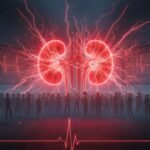Vitamin D is called the “sunshine vitamin.” This vitamin is extremely important for a healthy body. A survey report indicates that vitamin D deficiency is very common in India. Approximately 70% of people in this country are suffering from a deficiency of this vitamin. Low levels of this essential nutrient have a significant impact on the body. Let’s find out what problems appear in the body when there is a vitamin D deficiency and what should be done to increase its levels?
These problems appear in the body when vitamin D levels are low:
Weakens bones: The most significant impact of vitamin D deficiency is on bone health. Vitamin D is essential for the absorption of calcium, which is necessary for maintaining strong bones. In children, its deficiency can lead to rickets, a condition in which the bones become soft and weak. Vitamin D deficiency can also lead to osteoporosis and fractures.
Low immune function: Vitamin D is crucial for the proper functioning of the immune system. Its deficiency can weaken the immune response, making the body more susceptible to infections. In such cases, vitamin D supplementation may reduce the risk of acute respiratory infections, especially in people who are deficient.

Mental health: Vitamin D is present in different parts of the brain, affecting neurotransmitters that regulate mood. Its deficiency has been linked to mood disorders such as depression and anxiety. According to a study review, people with low vitamin D levels were more likely to experience symptoms of depression.
Affects the skin: A study review by the NIH indicated that vitamin D deficiency can exacerbate certain skin problems. Vitamin D plays a role in the growth and repair of skin cells. Its deficiency can lead to several skin problems such as eczema and psoriasis.
How to increase Vitamin D levels?
Sun exposure: Sunlight is a natural source of vitamin D. This vitamin is different from other vitamins because the body can produce it itself when the skin is exposed to sunlight.
Food sources: It can also be obtained from certain foods such as fatty fish like salmon, mackerel, and sardines, fortified dairy products, milk, orange juice, egg yolks, and supplements. Supplements are available for people at risk of vitamin D deficiency and should be taken after consulting a healthcare professional.







